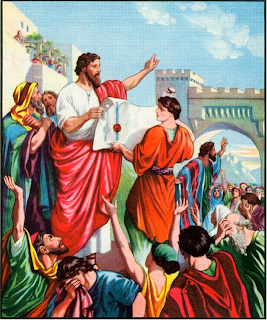 TODAY’S SPECIAL: Jeremiah 1:1-19
TODAY’S SPECIAL: Jeremiah 1:1-19
TO CHEW ON: “Before I formed you in the womb I knew and approved of you as My chosen instrument, and before you were born I separated and set you apart, consecrating you a prophet to the nations.” Jeremiah 1:5 Amplified
It’s reassuring to see behind the scenes into the lives of people we consider spiritual giants – like Jeremiah. According to our passage today, he wasn’t exactly low maintenance when he got started. To help him get over his worries and misgivings, God made three things clear to him at the beginning of his prophet-ship:
1. He was picked for this specific assignment. Before he ever existed, God knew him, set him apart, and appointed him.
2. God had one answer to all his objections: “I am with you…”
3. His effectiveness was guaranteed. His power would be above that of earthly kings and rulers. His word and influence would root things out, pull things down. He would have authority to destroy, throw down, build and plant.
Though on some level this passage is specific to Jeremiah, on another these three principles apply to us too.
- God knew each of us before we physically existed. From before time He had our destiny planned. (See also Psalm 139:13-16; Ephesians 2:10.)
- Though we may feel inadequate to do the assignments He gives us, God’s words to Jeremiah are also His words to us: "I am with you" (See also Isaiah 43:1-3; Matthew 28:19-20.)
- As God works through us we will have influence and authority far beyond anything that could be expected in the natural. (See also Matthew 18:18-20.)
So be encouraged. God has a specific plan for your life. He is with you. Your life will make a bigger difference than you ever imagined!
PRAYER: Dear God, please help me grasp Your potential for me and to bring it into reality in my life today. Amen.
MORE: On God’s call:
“It is easier to serve God without a vision, easier to work for God without a call, because then you are not bothered by what God requires; common sense is your guide, veneered over with Christian sentiment. You will be more prosperous, successful and leisure-hearted if you never realize the call of God. But if once you receive a commission from Jesus Christ, the memory of what God wants will always come like a goad; you will no longer be able to work for Him on the common-sense basis…. Never consider whether you are of use; but ever consider that you are not your own but His.” – Oswald Chambers, My Utmost for His Highest (March 4 reading - emphasis added)














